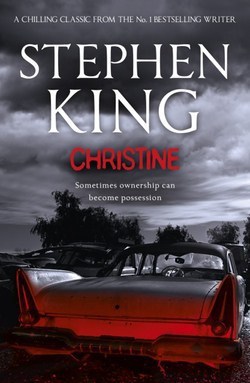Tracing The Trails Of The King : Christine
“Leigh left college to be married, and then it was goodbye Drew and hello Taos. I went to her wedding with hardly a qualm. Nice fellow. Drove a Honda Civic. No problems there.”
― Stephen King, Christine
.
I have read that Stephen King doesn’t care much for Christine and I’m not really sure why. It’s certainly true that the perspective on a  work from that of the writer is always and essentially different from that of the reader, looking in from the other side. There is a great analogy about how what you see in a book is a lot like looking at an iceberg. What you see is actually only what appears above the surface of the water. If you go below, you really see how massive and huge the iceberg is. This is not unlike the writing process as there is so much more material and context, work and sweat that only the author gets to experience, leading up to the final product of the book.
work from that of the writer is always and essentially different from that of the reader, looking in from the other side. There is a great analogy about how what you see in a book is a lot like looking at an iceberg. What you see is actually only what appears above the surface of the water. If you go below, you really see how massive and huge the iceberg is. This is not unlike the writing process as there is so much more material and context, work and sweat that only the author gets to experience, leading up to the final product of the book.
I suppose Christine could be an example of how a story has the ability to get away from you. The book is broken up into three acts. The first and third act are told in first person, from the perspective of Dennis, one of two main characters of the story. Dennis is the one who gets to watch, as his best friend slowly deteriorates into madness at the will of this evil car. The second act is told from Arnie’s perspective. King has talked about how he disliked having to incorporate this shift in point of view and that it became necessary when he wrote the conclusion of the first act with Dennis breaking his leg in a football accident. As the story wasn’t going to progress very much if it was limited to the perspective of a hospital bed, he moved the point of view of the story over to Arnie for the second act.
While I guess I understand where King is coming from and while I know that perspective shifts are often frowned upon, I actually think it benefits the story in this case. I think that Christine is a great metaphor for addiction, ironic in itself considering the point in King’s life in which it was written. Arnie is sucked down into a world in which he loses control, where his lust for this car slowly destroys him. In any kind of a story like this, I think that the impact is heightened if we get to have the perspective from within as well as without. I think that Arnie becomes more of a tragic character than he might have been, if the entire book had been told purely from Dennis’ perspective.
I’m a huge fan of the notion of cursed objects. Mostly because there is no mercy to be had, nothing to negotiate. And one thing I really like about Christine is the ambiguity in terms of whether or not the car is inhabited by a malevolent spirit or if we are actually seeing the ghost of the previous owner, taking his revenge out through the car itself. King leaves it up to us to decide and I think that’s the better way to go about it. Is it possible that the car could both be cursed by some kind of evil entity and be haunted by the spirit of a former victim? The car has certainly borne witness to a ton of death. Anything is possible.
One thing I also liked about the book is how you have multiple love triangles going on at the same time. As would be expected from the nature of the book, you have the relationship between Arnie and Dennis and how their friendship is damaged by Arnie’s increasing devotion to the car that Dennis pretty much hates from the start. But separate from that, there is also the relationship between the two friends and Leigh, the attractive student who transfers to school. Against all odds, Leigh ends up dating Arnie but as that relationship develops, Dennis comes to figure out that he has feelings for her as well. That then leads to the final triangle, namely that of Arnie, Leigh and Christine. As Leigh feels progressively repulsed and threatened by the car, and finds herself attracted to Dennis as well, she starts to disengage from Arnie. As he sees the betrayal from his best friend, he begins to struggle somewhat, choosing between the pull of his dream car and his own ego-driven feelings of jealousy over his ownership of the “dream girl”.
All of this smacks of a Telenovella and in the hands of many other authors would have likely ended up cheesy and easily dismissed. Somehow, King pulls it off. He creates the characters, layers the narrative and finds the emotions in a way to bring it all down to a very human and entertaining level. It’s interesting to me how Leigh is used in the story. By all rights, Arnie should not be the type of guy who ends up with her. The fact that he basically turns his back on that chance accentuates how much he seems to be changing, and taken in by the power of his car.
There seems to be a penchant for supernaturally powered cars in the King family. His short story “Trucks”, from Night Shift features vehicles all over the country which become sentient and start killing people. This story would be the basis for the movie, Maximum Overdrive. Again, in the collection Skeleton Crew, a story titled “Uncle Otto’s Truck” features a haunted pickup truck. His novella, Mile 81 sports a pretty frightening demonic (possibly alien?) car. In his son, Joe Hill’s book NOS4A2, the villain of the story, Charlie Manx drives around in a supernaturally charged 1938 Rolls-Royce Wraith. And while it would be easy to dismiss all of this with an eye roll and a muttered comment of, oh great, another evil car, all of these stories manage to stand on their own and bring something fresh to the concept.
In all, while I wouldn’t put Christine on my list of all time favorite King books, it’s definitely a fun and entertaining read. He doesn’t spend too much time explaining or bogging down the narrative with a bunch of over-bearing exposition. There’s just enough and just the right amount of creepy atmosphere to make this book great. I know there are some who don’t connect with this book as much as others but I think that it is a great representation of this era of King’s writing. Well crafted and nicely executed. Scary and compelling.
Stephen King, doing what he does best.
.
My name is Chad Clark, and I am proud to be a Constant Reader.
.
.

.
.
.






